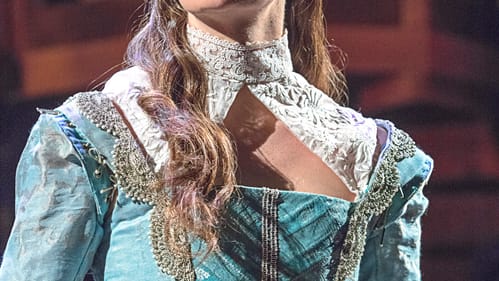Stay in the Loop
BSR publishes on a weekly schedule, with an email newsletter every Wednesday and Thursday morning. There’s no paywall, and subscribing is always free.
Where there's a Will
Pennsylvania Shakespeare Festival presents Lee Hall's 'Shakespeare in Love'

Lee Hall’s stage adaptation of Shakespeare in Love, the wildly successful 1998 Best Picture winner, holds the title of most produced play in the United States, according to American Theatre magazine. Patrick Mulcahy’s slick production for Pennsylvania Shakespeare Festival offers some clues to support its sudden ubiquity.
Humor for the groundlings
Like the film on which it’s based, the play gushes with romance, as the young and dashing Bard (Luigi Sottile) grows smitten with Viola de Lesseps (Mairin Lee), a well-born lady who longs to defy English law and act on the stage. Unhappy with her boring life of privilege and her arranged marriage to sniveling Lord Wessex (Christian Coulson), Viola binds her breasts, dons a pageboy wig, and auditions for Shakespeare’s newest would-be comedy: Romeo and Ethel, the Pirate’s Daughter.
We all know how that play will turn out. The film’s screenplay was coauthored by Tom Stoppard, but even though I haven’t seen the movie in 20 years, I still anticipated the jokes in Hall’s script before they landed. The play’s warm familiarity likely contributes to its popularity, and it gets by on a healthy dose of charm. Try not to swoon when Will and Viola, finally aware of the secrets they’ve been hiding, tumble into each other’s arms.
But the piece also contains long stretches of banality and, worse yet, coarse humor seemingly pitched to the lowest common denominator. Jokes at the expense of Elizabethan theatrical customs — chiefly, the casting of men in women’s roles — grow tiresome quickly, particularly when male actors overplay feminine mannerisms.
Such choices undercut the reality that these were skilled craftsmen engaged in serious verisimilitude. It also feels especially retrograde in 2018 to play moments of men kissing men dressed as women, or a man kissing a woman he thinks is a man, primarily for laughs.
Wherefore art thou, Juliet?
Hall also engages with anti-Stratfordian conspiracy theories by presenting Christopher Marlowe (Justin Adams, in a winning performance) as a well of insight into which Shakespeare abundantly dipped. How are we to believe Marlowe’s pronouncement that Will was “the best of us all” when we’re told he couldn’t even churn out the first line of Sonnet 18 without Kit’s help? No one questions that Shakespeare liberally lifted plots from established works, but this level of thievery seems needlessly exaggerated.

Mulcahy buffs some of the play’s rougher edges, buoyed by a fine physical production (designed by Daniel Crowley) and even finer acting ensemble. Sottile, a former Philadelphia performer now based in Chicago, balances cocksure arrogance and poetic vulnerability ideally, crafting a very real portrait of a talented, possibly troubled man of the theater. He speaks the interpolated snatches of Shakespeare’s verse with a ravishing cadence suggesting the kind of natural classical actor rarely seen today.
Strong support comes from two of Philadelphia’s best actors playing two of London’s premier talents: Brandon J. Pierce offers a swaggering, swashbuckling Ned Allyn, and Christopher Patrick Mullen preens as pompous Richard Burbage. Starla Benford has a ball as Queen Elizabeth, aided in her fun by Lisa Zinni’s marvelous costumes. And Buddy, a 16-month-old golden retriever, gives a performance so winning he walks away with the final bow.
Only Lee falters. Having to contend with memories of Gwyneth Paltrow at her most effervescent is no easy feat, but Lee’s wan line readings do little to suggest an actor who would make Shakespeare sit up and take notice. She’s even less moored when, in the final scene, she sheds her boy drag to speak Juliet’s immortal speech. Opposite Sottile, for whom verse is practically a second language, her deficits are all too clear.
The deficits in Hall’s writing are clear, too, but often forgivable. Shakespeare in Love has neither the grandeur nor the grandiloquence of actual Shakespeare — for that, you have to head next door and catch Matt Pfeiffer’s smashing production of Twelfth Night — but it serves as a charming respite from the summer heat. And where there’s a Will as good as Sottile, there’s certainly a way.
What, When, Where
Shakespeare in Love. By Lee Hall, Patrick Mulcahy directed. Through August 5, 2018, at the Pennsylvania Shakespeare Festival, 2755 Station Avenue, Center Valley, Pennsylvania. (610) 282-WILL or pashakespeare.org.
Sign up for our newsletter
All of the week's new articles, all in one place. Sign up for the free weekly BSR newsletters, and don't miss a conversation.

 Cameron Kelsall
Cameron Kelsall